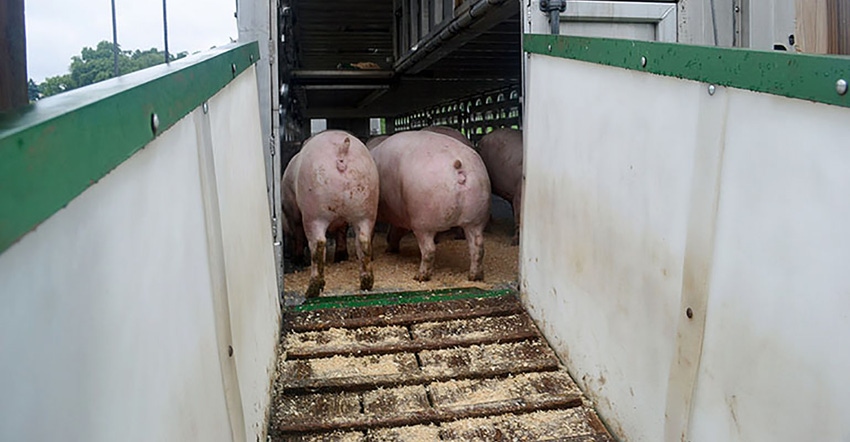Legislative Watch: Premium subsidies for livestock insurance; meat exports boost corn and soybeans; beef investigation shows no wrong-doing; ag trade advisers appointed.

USDA's Risk Management Agency will now provide premium subsidies for Livestock Gross Margin insurance program for swine and cattle beginning in the 2021 crop year. Premium subsidies are already a feature of crop insurance.
RMA Administrator Martin Barbre says, "These changes build upon RMA's continued effort to make livestock policies more affordable and accessible for livestock producers. We are working to ensure that these improvements can be implemented by the July 31 sales period so producers can take advantage of these changes as soon as possible."
The subsidies will be based on the deductible selected by the producer. For LGM-Swine, the subsidy will range from 18% with zero deductible up to 50% with a deductible of $12 or greater. For LGM-Cattle, the subsidy will range from 18% with zero deductible up to 50% with a deductible of $70 or greater.
Red meat exports boosts corn and soybeans
Corn and soybean producers benefit from pork and beef exports, according to a recent study by the U.S. Meat Export Federation. Since 2015, indirect exports of corn and soybeans through red meat exports have been the fastest-growing use of corn and soybeans.
The study which uses 2019 export data found:
Value of red meat exports' feed use of corn and soybeans
In 2019, U.S. pork and beef exports used 480 million bushels of corn. Corn revenue generated by pork exports totaled $1.8 billion (480 million bushels multiplied by an average annual price of $3.75 per bushel).
In 2019, U.S. pork exports used 2.12 million tons of soybean meal, which is the equivalent of 89.2 million bushels of soybeans. Soybean revenue generated by pork exports totaled $751.7 million (89.2 million bushels multiplied by an average annual price of $8.43/bushel).
Pork and beef exports also used about 3 million tons of distiller's dried grains with solubles in 2019 at an annual average price of $137 per ton. This generated $411.8 million in revenue for ethanol mills' co-products.
Value to U.S. corn and soybean crop from red meat exports
In 2019, pork and beef exports contributed more than 12% of the per bushel price of corn ($0.46 per bushel) of an annual average price of $3.75 per bushel. With total production of 13.62 billion bushels, the value of pork exports to the U.S. corn crop was $6.26 billion.
In 2019, pork exports contributed 9% of the per bushel price of soybeans ($0.76 per bushel) of an annual average price of $8.43. With total production of 3.55 billion bushels, the value of pork exports was $2.7 billion to the U.S. soybean crop.
USMEF's original study on the value of red meat exports to U.S. corn and soybeans was conducted in 2016.
Update on investigation of beef market
USDA's Agricultural Marketing Service released its "Boxed Beef and Fed Cattle Price Spread Investigation Report," which did not indicate wrongdoing but offered recommendations regarding transparency and helping small and local meat processors.
Secretary of Agriculture Sonny Perdue called for the investigation after the fire at the Tyson beef plant in Holcomb, Kan., closed the facility. The investigation was expanded later to take into consideration the effects of the coronavirus pandemic on the cattle and beef markets.
Perdue says, "The report examines these economic disruptions and the significant increase in the spread between boxed beef and fed cattle prices that resulted from them. While we're pleased to provide this update, we assure producers that our work continues in order to determine if there are any violations of the Packers and Stockyards Act. If any unfair practices are detected, we will take quick enforcement action."
The report makes various recommendations that Congress and the beef industry should consider including strengthening USDA's enforcement tools and changes to reporting for prices and cattle delivery. USDA is also looking at what changes it can make to assist producers with risk management tools and increase lending to small meat processors.
Appointments of ag trade advisers
USDA and the U.S. Trade Representative announced the appointment of additional members to the agricultural trade advisory committees.
The Agricultural Policy Advisory Committee provides advice to the USDA and USTR on trade policy issues including existing trade agreements and future trade agreements. The Agricultural Technical Advisory Committees provide technical advice and guidance on specific product sectors.
Agricultural Policy Advisory Committee
Constance Cullman, American Feed Industry Association
David Puglia, Western Growers
David Salmonsen, American Farm Bureau Federation
ATAC for Trade in Animals and Animal Products
Robert DeHaan, National Fisheries Institute
Mallory Gaines, American Feed Industry Association
David Herring, Hog Slat Inc./TDM Farms
James Parnell, Alabama Farmers Federation
Maria Zieba, National Pork Producers Council
ATAC for Trade in Fruits and Vegetables
William Callis, U.S. Apple Export Council
Casey Creamer, California Citrus Mutual
Jodi Devaurs, California Table Grape Commission
Jonathan Maberry, Washington Red Raspberry Commission
Caroline Stringer, California Fresh Fruit Association
ATAC for Trade in Grains, Feed, Oilseeds and Planting Seeds
Peter Bachmann, USA Rice Federation
William Gordon, American Soybean Association
Derek Haigwood, D.I.D. Farms
Patrick Hayden, North American Export Grain Association
Dalton Henry, U.S. Wheat Associates
Edward Hubbard, Renewable Fuels Association
Tina Lyons, Double River Forwarding LLC
ATAC for Trade in Processed Foods
Kevin Latner, National Industrial Hemp Council
Richard (Denton) McLane, McLane Global Trading
Max Moncaster, National Association of State Departments of Agriculture
Bernadette Wiltz, Southern United States Trade Association
ATAC for Trade in Tobacco, Cotton and Peanuts
Karl Zimmer, Premium Peanut
Source: P. Scott Shearer, who is solely responsible for the information provided, and wholly owns the information. Informa Business Media and all its subsidiaries are not responsible for any of the content contained in this information asset.
About the Author(s)
You May Also Like



